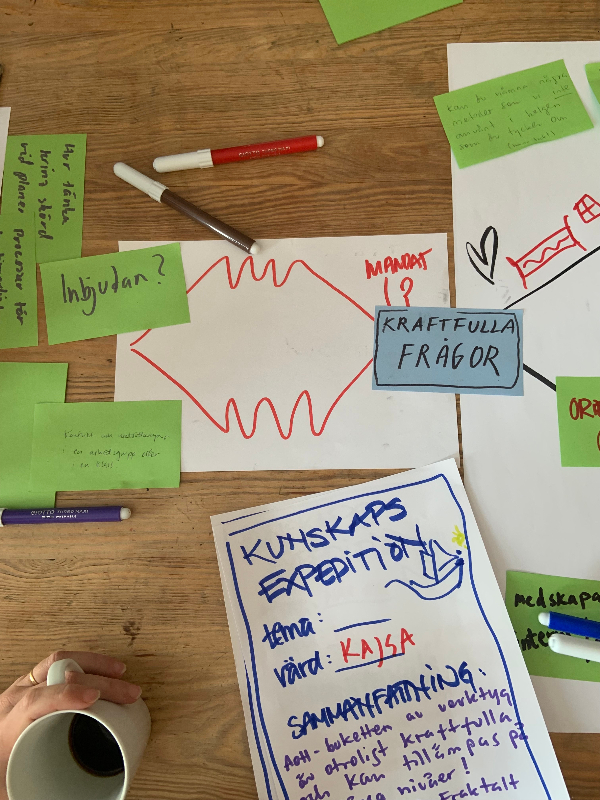- Sustainability-related change processes.
- Increased participation, diversity and perspective-taking.
- Systems Theory and Systems Thinking.
- Complexity Theory.
- How to constructively and co-creatively lead change processes.
DM2800 Leading Complex Change Processes 7.5 credits

From course evaluation 2025:
"The course offers everyone a unique opportunity to learn, grow and thrive. It was well organised, and the chosen topics were highly relevant and fitting. It is a truly diverse course that challenges the current approach to science, engineering and teaching. It prepares you for the complex problems that the future might hold.
I have never taken a course at university that could compare to this one. It is an outstanding learning experience that should be made available to all students, particularly at KTH. The course spoke to me not only professionally, but personally as well, which is extraordinary.
The teachers are outstanding and truly believe in what they teach. They are so genuinely interested in their students' learning and growth that you feel comfortable.
I cannot reiterate enough that this is a superb course, taught by wonderful people, which will change and advance you in ways that are indescribable, it should really be a must for everyone!"
The course aims to teach students understand, relate to and lead sustainability related change processes in a world that is characterized by increasing complexity and uncertainty. The course will provide both theoretical knowledge and practical skills.
Information per course offering
Information for Autumn 2026 Start 24 Aug 2026 programme students
- Course location
KTH Campus
- Duration
- 24 Aug 2026 - 23 Oct 2026
- Periods
Autumn 2026: P1 (7.5 hp)
- Pace of study
50%
- Application code
11160
- Form of study
Normal Daytime
- Language of instruction
English
- Course memo
- Course memo is not published
- Number of places
1 - 40
- Target group
- Open for all programmes from year 3, and for students admitted to a master's programme, as long as the course can be included in the programme.
- Planned modular schedule
- [object Object]
- Schedule
- Schedule is not published
Contact
Course syllabus as PDF
Please note: all information from the Course syllabus is available on this page in an accessible format.
Course syllabus DM2800 (Spring 2026–)Content and learning outcomes
Course contents
Intended learning outcomes
After passing the course, the student should be able to
- explain theories and analytical tools regarding complexity and leadership, systems thinking and how to lead change processes
- identify complex sustainability-related problems and with limited information plan for co-creation processes
- analyze limitations of traditional engineering methods when dealing with complex sustainability-related problems
- lead groups in complex situations, in a critical, co-creative and creative way, both individually and in collaboration with others
- develop practice around co-creation processes
in order to
- be able to understand, relate to and lead sustainability-related change processes in a world characterized by increased complexity and uncertainty and take responsibility for their own learning.
Literature and preparations
Specific prerequisites
Skills in scientific thinking and writing through one of the following:
- degree obtained at university level of at least 180 credits
- completed or started degree project aiming at a degree at university level of at least 180 credits
- completed course in research methodology/theory of science, 6 credits.
Literature
Examination and completion
Grading scale
Examination
- DELA - Active participation, 2.0 credits, grading scale: P, F
- DELB - Active participation, 3.0 credits, grading scale: P, F
- INL1 - Hand-in assignment, 2.5 credits, grading scale: P, F
Based on recommendation from KTH’s coordinator for disabilities, the examiner will decide how to adapt an examination for students with documented disability.
The examiner may apply another examination format when re-examining individual students.
If the course is discontinued, students may request to be examined during the following two academic years.
Other requirements for final grade
Mandatory attendance (75%) at the sessions that involve co-creation processes. These sessions consist of 6 half-days of 4 hours each, spread over three weeks. These sessions are held on the KTH campus and physical attendance is required.
Examiner
Ethical approach
- All members of a group are responsible for the group's work.
- In any assessment, every student shall honestly disclose any help received and sources used.
- In an oral assessment, every student shall be able to present and answer questions about the entire assignment and solution.